News - April 2016
20 April 2016 - Game of Thrones co-creators among 13 to be recognised for inspirational contribution
 As Game of Thrones fans around the world await the season six release of the hugely successful HBO fantasy drama series on Monday 25 April, Ulster University is to recognise the contribution made by two of its co-creators, David Benioff and Daniel B Weiss.
As Game of Thrones fans around the world await the season six release of the hugely successful HBO fantasy drama series on Monday 25 April, Ulster University is to recognise the contribution made by two of its co-creators, David Benioff and Daniel B Weiss.
The renowned American screenwriters and producers are just two of 13 inspirational individuals who will be awarded honorary degrees by Ulster University this year.
Receiving honours in recognition of their services to the community are civil rights campaigner Ivan Cooper; Auxiliary Bishop of Down and Connor, Dr Anthony Farquhar; Claire Keatinge, the Commissioner for Older People; CEO of the WAVE Trauma Centre, Sandra Peake; Sister Mary Turley of the Flax Trust and, environmental conservationist, maritime historian and kayaker Robin Ruddock.
In addition, Professor Robert Pinker, the Acting Chair of the Press Complaints Commission; Supreme Court judge, Lady Brenda Hale; President of Philadelphia State University, Dr Stephen Spinelli; occupational therapist, Betty Hutchon and, businessman Terry Cross, will be recognised for inspirational work across their respective areas of education, health, law, business or public life.
Commenting on the recipients, Ulster University Vice-Chancellor, Professor Paddy Nixon said: "Thousands of students graduate from Ulster University each year; young people and mature students, all looking to the future and ready to make a positive impact across society.
"As we recognise their individual achievements, it is vital that they have real life, relevant examples of people who have excelled, who inspire, and who truly make a difference to the world around them.
"From Daniel Weiss and David Benioff who have placed Northern Ireland's creative industries capability on the global stage, to the pioneering efforts of Ulster alumna, Betty Hutchon, who has enhanced the lives of incalculable numbers of newborn and preterm infants, each of our honorary graduates has a special relevance and connection to the aspirations of today's students.
"Our honorary degree recipients not only represent the diversity of the sectors in which our graduates are employed, they represent the determination, confidence, talent and creativity which we know our students can and will emulate as they progress in their chosen careers."
For more on the story: Ulster University
26 April - Royal opening for Ulster University's Belfast campus development
 Her Royal Highness The Princess Royal has officially opened Phase One of Ulster University's Belfast campus development.
Her Royal Highness The Princess Royal has officially opened Phase One of Ulster University's Belfast campus development.
Ulster University is transforming higher education in the heart of the city with an investment of £250 million to create a dynamic state-of-the-art teaching, learning and research environment. Due for completion in 2018, the campus will provide a space for academia, industry and local communities to collaborate and thrive.
The Royal Visitor toured the modern building and met with students from Ulster University's Belfast School of Art who showcased their creative skills in silversmithing, fine art and ceramics.
Image: Ulster University’s Vice-Chancellor, Professor Paddy Nixon, with Her Royal Highness The Princess Royal and Deputy Vice-Chancellor, Professor Alastair Adair.
Source: Ulster University
Back to top
20 April 2016 - New Ulster University app to aid management of chronic diseases
 Ulster University is encouraging the public to have their say in the development of a revolutionary smartphone app that will transform how patients and healthcare professionals manage and treat chronic diseases.
Ulster University is encouraging the public to have their say in the development of a revolutionary smartphone app that will transform how patients and healthcare professionals manage and treat chronic diseases.
As the leading cause of death across the globe, chronic diseases are long term conditions including respiratory disease, diabetes and heart disease. While these conditions cannot be cured, they can be managed in order to maximse a patient's quality of life.
Computer science experts at Ulster University are developing new technology that aims to provide a baseline and post-treatment assessment of general health, allowing doctors to identify the effectiveness of chronic disease interventions.
The new Ulster University app will use smartphone sensors and an innovative prediction model to provide an overall assessment of the general health of chronice disease sufferers. General health is a measure of how much a person's daily life is affected by their health, for example how they are affected by fatigue, physical ailments, pain or by their emotions.
Lead researcher Dr Daniel Kelly from Ulster University said: "When treating patients with chronic conditions, doctors need to know if the treatment resulted in improved general health for a patient. To really understand if a patient's health has improved, the doctor needs to know if the patient's quality of life has enhanced, for example do they have more energy? Can they do more activities? Doctors currently measure this using a health status questionnaire.
"Research shows that these questionnaires do not work on an individual basis, as they can be open to human error or patients providing an inaccurate account of how they really feel. This means the clinician receives a measurement of general health that doesn't truly reflect the patient.
"The new Ulster University app aims to remove the risk of inaccuracies by providing objective and individualised feedback to clinicians and patients. Doctors can use the information from the app to see changes in a person's daily life and evaluate benefit of any treatment the patient may have been prescribed.
"We are currently developing the app and are calling on the general public to get involved. Anyone with an android phone can help with this research by downloading the app – you just need to take a short questionnaire and keep the app installed and running on your phone in the background for at least four days.
"All data uploaded by users will be completely anonymous and nothing will be shared from the app. The data will help us build a more accurate understanding of how behaviour and general health are linked. This will contribute to the development of the predictive model and ultimately help us develop a user-friendly app for chronic disease sufferers.
"Smartphones are non-invasive, have multiple sensors, powerful processors and are low cost, making them idea for a health measurement device. The impact of Ulster University's app could be huge for patients suffering from chronic diseases helping Doctors to identify quickly and accurately what treatment is having the most positive effects."
The App is called "Health U: Fitness Tracker" and can be downloaded for free on Google Play by searching for Health U.
For more on the story: Ulster University
Back to top
12 April 2016 - Ulster University prostate cancer research uncovers reason for patient relapse
 A major breakthrough by Ulster University scientists into prostate cancer has revealed the reason why many men may suffer a relapse within two years of starting one of the most frequently used treatments for the disease.
A major breakthrough by Ulster University scientists into prostate cancer has revealed the reason why many men may suffer a relapse within two years of starting one of the most frequently used treatments for the disease.
Prostate cancer is the most common cancer among men in Northern Ireland. Around 1,000 men in Northern Ireland are diagnosed with the disease each year and the five year survival rate is just under 90 per cent.
Ulster University's research findings, published in the British Journal of Cancer, revealed that some men who receive a hormone treatment known as androgen deprivation therapy can suffer a relapse; not because the treatment is ineffective but because a low level of oxygen in the tumour can trigger genetic changes that accelerate the growth of new cancer cells.
Ulster University is now studying the benefits combined drug therapy can bring in targeting the low oxygen cells and prevent tumour growth following the hormone therapy.
Ulster University's Dr Declan McKenna said: "Low oxygen in prostate tumours is a well accepted finding, but our research now confirms that various genes can react to those low oxygen levels and actively promote tumour development. This is a hugely significant advance in the global battle against prostate cancer as it means we can focus efforts on effectively targeting this problem to enhance future treatment options for patients.
"At Ulster University we are now investigating how we can develop and tailor improved treatment for individual prostate cancer patients through combined drug therapy, with the ultimate aim of enhancing the effectiveness of the hormone therapy and reducing the incidence of relapse."
Ulster University's research was funded by the Department for Employment and Learning, and Prostate Cancer UK, with support from the Movember Foundation.
Dr Iain Frame, Director of Research at Prostate Cancer UK, said: "This type of hormone treatment is the current gold standard for men with advanced prostate cancer, and can keep the disease at bay for years. However we need to know much more about what is happening when hormone treatment stops working and what we can do to get the best out of the treatment choices that come later.
"This study nicely brings out the importance of the changes that occur in prostate cancer cells as they respond to this therapy. By understanding what these changes mean, we can help clinicians decide which other treatments will be the most effective to offer men once it stops working. Finding ways to beat prostate cancer by improving the impact of current treatments is one of the key focuses of Prostate Cancer UK's new strategy."
For more on the story: Ulster University
Back to top
7 April 2016 - Ulster University research shows epilepsy drug may not increase birth defects risks
 New research from Ulster University has shown a drug used to treat epilepsy may not increase the risk of birth defects such as cleft lip, cleft palate or clubfoot as previously thought.
New research from Ulster University has shown a drug used to treat epilepsy may not increase the risk of birth defects such as cleft lip, cleft palate or clubfoot as previously thought.
More than 500,000 people in the UK have epilepsy, 20,000 in Northern Ireland and 40,000 in Ireland. Maintaining effective treatment during pregnancy is important because seizures may cause harm to the fetus.
The epilepsy drug Lamotrigine can typically be used on its own, or in combination with other medications to control seizures. It is also prescribed to prevent mood swings for those with bipolar disorder.
New research by Ulster University into this specific drug estimates that the maximum additional risk of cleft lip or cleft palate would be one in every 550 babies exposed to it, a substantial reduction on previous studies.
The study is part of a programme of research on antiepileptic drugs by Ulster University researchers. The study was funded by Glaxo Smith Kline and was published today in Neurology, the medical journal of the American Academy of Neurology.
Ulster University's Professor Helen Dolk said: "An initial US study of this drug showed an increase for cleft lip or cleft palate. A number of other studies, including our previous study, have not shown an increase in those conditions, although our previous study did show an increased risk of clubfoot.
"This new study has a much larger population size – more than double the size of our previous study.
"We cannot exclude a small risk of cleft lip or cleft palate, but we estimate the excess risk among babies exposed to the drug, if any, to be less than one in every 550 babies. We did not find any further evidence of a clubfoot risk.
"Since excess risks of cleft lip or palate have been reported for a variety of antiepileptic drugs, we recommend that for all mothers with epilepsy, whatever their drug exposure, special attention be given to examining the baby for cleft palate.
"It is important that women with epilepsy and other women taking antiepileptics are given preconception care to consider which antiepileptics have the best benefit versus risk profile for them in pregnancy as any change of medication needs to occur before pregnancy. Some antiepileptics, most notably valproic acid, should be avoided in pregnancy."
Professor Dolk is now recommending an additional study to give specific information on the effect of high Lamotrigine dosage on birth defects.
For more on the story: Ulster University
Back to top
25 March 2016 - School of Nursing UK ranking shines light on talented graduates
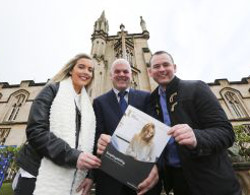
With Ulster University's School of Nursing recently ranked the 6th best in the UK and 41st best in the world, over twenty local and international hospitals, heath trusts and medical firms gathered at the University's Magee campus in Derry~Londonderry to discuss hundreds of job opportunities and wider career prospects with final year nursing students. Celebrating Ulster University's success in the rankings and looking forward to their future in nursing are Catriona Simpson and Rory Doherty, who will graduate this year.
For more information on the QS World University Rankings by subject 2016 go to: www.topuniversities.com/universities/ulster-university#subject
For more on the story: Ulster University
Back to top
24 March 2016 – Minister discusses new medical school proposal with Ulster University
 Health Minister Simon Hamilton has met with Ulster University's Vice-Chancellor, Professor Paddy Nixon, to discuss the University's proposal to establish a Graduate Entry Medical (GEM) school in the North West.
Health Minister Simon Hamilton has met with Ulster University's Vice-Chancellor, Professor Paddy Nixon, to discuss the University's proposal to establish a Graduate Entry Medical (GEM) school in the North West.
"This proposal is in the very early stages of development and I have asked senior officials within my department to engage with discussions to explore the potential of a medical school in the North West. It is proven that medical graduates are more likely to seek employment close to where they have been educated. Such a school could provide a platform to attract and retain skilled people into the medical profession, especially those from the North West area. That is good for the economy, skills development and will improve the overall health and well-being of citizens."
The Minister concluded: "Further development of this proposal, which sees GP training and prioritising the quality and safety of patient care are at its core, is underway. I look forward to seeing the outcome of that work in due course."
Professor Paddy Nixon, Vice Chancellor, Ulster University said:
"I am delighted that the Health Minister has added his support, and that of his department, to Ulster University's plans to develop a graduate medical school in Derry~Londonderry. I strongly believe that given our leading role in personalised medicine at the C-TRIC facility, our position as one of the top nursing schools in the UK, existing partnerships with Altnagelvin Hospital and the broader University's reputation for world-leading excellence in biomedical research, that our Magee campus is the perfect location for such a strategically important development.
"Plans are at an early stage and a business case is currently being developed to move this proposal to the next phase. I look forward to working with the Health Minister and key stakeholders, all of whom have a role to play in making the medical school a reality.
"We have strong ambitions for Ulster University in Derry~Londonderry and remain fully committed to realising its full potential and delivering significant skills and economic benefits to the wider region."
For more on the story: Ulster University
Back to top
24 March 2016 - Ulster University collaboration to transform decision making in breast cancer diagnosis and treatment
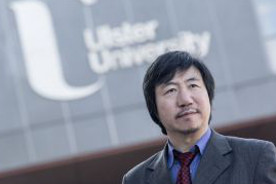 Researchers from Ulster University have secured over €550,000 as part of a €3.3 million European-wide project aiming to transform the decision-making process for doctors in diagnosing and treating breast cancer, the most common cancer in women worldwide.
Researchers from Ulster University have secured over €550,000 as part of a €3.3 million European-wide project aiming to transform the decision-making process for doctors in diagnosing and treating breast cancer, the most common cancer in women worldwide.
Funded by the European Union's Horizon 2020 research programme, a multi-disciplinary team of Ulster University researchers in computer science, health sciences and psychology will develop a pioneering medical image analysis tool. The tool will extract important features from clinical images, such as mammograms, to assist breast tissue and tumour characterization. This will provide vital information for breast cancer diagnosis and treatment.
Ulster University researchers will also contribute to the development of a decision support system that can help doctors to make personalised treatment recommendations based on previous comparable cases and the patient's genetic information.
The University research forms part of the Decision Support and Information Management System for Breast Cancer (DESIREE) project, which aims to provide web-based software for the personalised, collaborative and multidisciplinary management of breast cancer by specialised breast units, from diagnosis to therapy and follow-up.
Professor Hui Wang from Ulster University said: "With an estimated one in twelve women developing breast cancer before the age of 75, the early diagnosis and treatment of the disease is vital when it comes to saving lives.
"Doctors are dealing with huge amounts of patient data accumulated as a result of breast cancer diagnostic tests and treatments. The DESIREE project aims to develop a clinical decision support system that will help breast cancer units to house information all in one place, and take informed decisions based on an integrated data analysis.
"The aim is not to replace biopsy procedures or the specialist skills of doctors, but to support their interpretation of clinical data, medical images and tests. Ulster University's involvement in the DESIREE project will ensure our world leading expertise can contribute to best practice in breast cancer units across Europe."
For more on the story: Ulster University
Back to top
16 March 2016 - Law School at Magee launches business law clinic for entrepreneurs
 Operating from the Magee campus, Ulster University Business Law Clinic will provide free legal advice, workshops and resources to start-up companies and entrepreneurs on range of complex legal issues including:
Operating from the Magee campus, Ulster University Business Law Clinic will provide free legal advice, workshops and resources to start-up companies and entrepreneurs on range of complex legal issues including:
•Types of business structure and business incorporation
•Regulatory advice on the laws that may affect entrepreneurs and their business
•Intellectual Property matters relating to patents, copyright and trademarks
•The law of contract relating to business including agreements such as non-disclosure agreements and employment contracts.
The legal advice will be provided by Ulster University law students under the guidance of legal professionals from collaborating law firms and academic staff in the School of Law at Ulster University, supported by staff from Queen Mary University of London.
Mr John Thompson, recently appointed as Course and Subject Director for Law at the Magee campus, will also oversee the Clinic.
“It’s an exciting time for law at Magee, for both staff and students as new opportunities open. Students graduating from the Magee campus already go on to practice as solicitors and barristers, or even attorneys in New York and California. Through the Law Clinic, our aim is to provide Magee students with a unique edge in the highly competitive employment market that is law.”
Clinic students have already received quality training - delivered in part by corporate lawyers at Google. Three students from the Magee clinic went to London, having been selected to take part in training at the London business hubs, as well as attending talks organised at the Royal Courts of Justice.
Mr Thompson concluded: “Building on the success of our undergraduate law courses, the Business Law Clinic is the next step in enabling the Magee campus to become a Centre of Excellence for Commercial Law Studies”.
Source: Ulster University
Back to top
7 March 2016 - Ulster University to empower young adults with disabilities to take control of their health

Researchers from Ulster University and NUI Galway have been awarded €295,000 to develop a weight management model for young adults with intellectual disabilities. It aims to decrease illness associated with obesity and empower these young adults to take control of their own health and wellbeing.
The new research is funded by the Marie Curie ASSISTID Fellowship and will be carried out by Ulster University's School of Psychology in partnership with NUI Galway.
Encouraging positive behavioural changes, the model will incorporate health education, goal setting, visual feedback and rewards. It will also explore the role of a smartphone app as assistive technology for weight management of those with disabilities.
Researcher Dr Claire McDowell from Ulster University said: "Ulster University will combine its world-leading expertise in behaviourial and health psychology with computing to create a comprehensive package of weight management that will be easily accessible to people with intellectual disabilities and support long-term positive behavioural changes.
"The findings of this research will empower these young adults to take control of their health and become more independent. This will reduce illness associated with obesity, increase self-esteem and enhance their overall wellbeing."
For more on the story: Ulster University
Back to top
2 March 2016 - Ulster University wins prestigious funding to cure vision loss
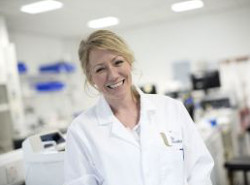
Ulster University has secured almost £100,000 from a prestigious research funding trust to develop a revolutionary treatment for an eye condition that has caused blindness in more than 250,000 people in the UK alone.
Age related macular degeneration (AMD) is the third leading cause of blindness worldwide and the commonest cause of severe visual impairment in older adults in the developed world.
The funding, secured from the Dowager Countess Eleanor Peel Trust, will support Ulster University in a 2-year study into new therapies for a specific type of age related macular degeneration known as wet AMD. Wet AMD, if left untreated, can cause a permanent loss of central vision. The current treatment is an injection into the eyeball. The team behind Ulster University's research aim discover a new and effective eye drop treatment that patients can self-administer to treat wet AMD. The new eye drops will help to reduce the symptoms and stop the disease from getting progressively worse.
Ulster University's Dr Bridgeen Callan said: "Ulster University's new research is about finding an alternative mechanism to get the drug into the eye without using an injection. The risk of infection from the current injection based treatment can lead to other eye complications and the invasive nature can cause pain and discomfort."
For more on the story: Ulster University
Back to top
24 February 2016 - A Giant Step for Employability

Ulster University Business School has taken a ‘giant’ step towards improving its graduates' employment opportunities by organising an inaugural Employability Event at the SSE Arena sponsored by the Belfast Giants and the MCS Group. Over 120 leading employers set up stalls for almost 600 students to seek information and hear first-hand about career prospects and current job openings in companies throughout Northern Ireland and beyond.
Professor Marie McHugh, Dean of Ulster University Business School explains, “As a business school we not only have a responsibility to impart theory and understanding, but we also have to equip our students with the practical skills and knowledge which makes them attractive prospects for employers. In turn, employers need to explain and promote the opportunities within their companies. Very often students have a perception about what a well-known company does but have no idea about the vast range of job opportunities available within that company. This event has allowed both groups to exchange knowledge, self-promote and lay the groundwork for future employment.”
Companies taking part in the event included Caterpillar NI, Citi Bank, Ernst & Young, PWC, and the Hastings Group.
Louise Smyth, Commercial Director, MCS Group Intelligent Recruitment Solutions said, “MCS Group are delighted to partner with Ulster University Business School for this fantastic event and look forward to working with their teams over the coming years to support graduate employability and career progression.”
After the employability event, participants were hosted by the Belfast Giants to watch their Elite league match against the Cardiff Devils.
Mark Brooks, Commercial Manager for the Stena Line Belfast Giants said, “Myself and all at the Giants are proud to have a long standing partnership with the Ulster University Business School. I thoroughly enjoyed watching Tuesday’s Cup semi-final with the Ulster University Business School staff and students, as well as the employers and look forward to welcoming them back to another game soon!”
Image: From left: Professor Marie McHugh; Louise Smyth; Brandon Benedict, player and assistant coach with the Belfast Giants; and Steve Thornton, Head Coach with the Belfast Giants.
For more on the story: Belfast Giants
Back to top
24 February 2016 - Strong housing market prevails according to Ulster University research

Northern Ireland's average house price is up nine per cent from the same time last year indicating that strong market conditions are prevailing, according to Ulster University's latest research.
The most recent Quarterly House Price Index examines the performance of Northern Ireland's residential property market over October, November and December 2015. It is produced by Ulster University in partnership with the Northern Ireland Housing Executive.
Lead researcher, Professor Stanley McGreal from Ulster University said: "This Ulster University research provides a quarterly snapshot of the housing market helping to inform those involved in the buying or selling process of local trends and developments."
Joe Frey, Head of Research at the Northern Ireland Housing Executive, added: "This is the highest annual rate of increase in house prices since the start of the major downturn in 2007 and confirms that the housing market has made substantial progress on the road to recovery. It is important, however, that the supply of new homes increases again in order to prevent the re-emergence of a more widespread affordability problem."
For more on the story: Ulster University
Back to top
23 February 2016 - Ulster University reveals findings of first ever research into schoolboy rugby injuries in Northern Ireland

Researchers at Ulster University, in collaboration with the Rugby Injury Surveillance Ulster Schools group, have revealed the results of a major study that for the first time ever, exploring the types and causes of injuries in schoolboy rugby across Northern Ireland.
The three year research project, which aims to make the game safer and better inform future rule changes, is the largest prospective study of schoolboy rugby injuries to date. It was carried out in 28 grammar schools across Northern Ireland, involving 825 players on 1st XV rugby squads.
The research points to a trend of increased injuries in older, heavier players who regularly undertake weight training.
Lead researcher, Dr Chris Bleakley from Ulster University, said: "We discovered that over 50 per cent of injuries occurred in the tackle situation or during collisions, however, the lighter players were less likely to sustain injuries. Larger players are used more during games and with their higher injury risk correlating to a higher volume of collisions, we recommend that this subgroup have their match load and training modified to lessen injury risk.
"The results of this study will allow us to develop recommendations for future preventative strategies, ultimately minimising risk to rugby players at school level. The aim is to make the game as safe as possible while still maintaining the spirit of this hugely popular sport."
Ulster Rugby Medical Director, Mike Webb, added "The research showed that players displayed a very high adherence to the recommended IRFU return to play guidelines following a concussion which is extremely encouraging. There would appear to be a change in attitude when it comes to concussion both at professional and grassroots level of the sport, those involved in the game are less likely to take the risk of playing on after a potential incident. "
For more on the story: Ulster University
Back to top
17 February 2016 - New Ulster University research reveals exposure to common sources of mercury does not excerbate Lupus
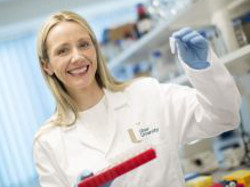
World-first research conducted by Ulster University has revealed that exposure to mercury through dental fillings or by eating seafood does not exacerbate symptoms of the autoimmune disease Lupus, a common fear of those living with the chronic condition.
Systemic Lupus Erythematosus (SLE), also known as Lupus, affects approximately 25 out of every 100,000 people in Western countries and involves the immune system attacking healthy cells, tissue and organs. There is no cure for the condition and symptoms range from mild to severe, including fatigue, skin rashes and swelling of the joints, all of which can have hugely negative effects on sufferers' quality of life.
The new Ulster University research found that there was no relationship between the number of dental fillings, which are known to include mercury, and the severity of the Lupus sufferers' symptoms. The research also found no detrimental relationship between mercury levels found in hair, a biomarker of mercury exposure primarily from seafood consumption, and severity of the disease.
Despite no scientific evidence, it is widely believed that exposure to the toxic metal mercury can act as a trigger of Lupus in those who are genetically predisposed.
In a world first, researchers at Ulster University's Northern Ireland Centre for Food and Health (NICHE) used human biological measures including hair, urine and dental profiling of Lupus suffers to examine the relationship between levels of the toxic metal mercury and the severity of the disease.
Lead researcher, Dr Emeir McSorley from Ulster University, said: "There is no doubt that mercury is toxic for humans, but the results of this research are promising and should help to reassure those suffering from Lupus that their dental fillings are not advancing symptoms of their condition or further damaging their health."
The Ulster University research was carried out in partnership with the University of Rochester in New York, with involvement of the Rheumatology Departments of the Belfast and Western Health and Social Care Trusts. It was partially funded by Department of Employment and Learning and the National Institute of Environmental Health Sciences.
For more on the story: Ulster University
Back to top
11 February 2016 - Ulster University welcomes support from the Rory Foundation for Sport Changes Life

As a founding partner of Sport Changes Life, Ulster University has welcomed support from Rory McIlroy's charitable foundation, the Rory Foundation, which will donate £120,000 to help raise aspirations of young people through sport.
The Rory Foundation has donated £120,000 to support the Sport Changes Life Victory Scholars programme, which gives students, primarily from US colleges, the opportunity to experience a life-changing year in Ireland whilst studying a postgraduate qualification. As part of the scholarship, the Victory Scholars also undertake community work throughout the year.
Rory said: "I'm delighted that my Foundation is able to support children and young adults through the Sport Changes Life programme. It's great that the programme's Victory Scholars come to Ireland to develop their skills while assisting local community outreach initiatives."
Deirdre Brennan, Professor of Physical Education and Sport at Ulster University and co-founder of Sport Changes Life said: "Ulster University provides an inclusive and inspiring environment for young people of all backgrounds to thrive. As a founding partner of Sports Changes Life, the University delivers initiatives that combine sport and education to enhance aspirations, boost career development and drive social change."
Image: Professor Deirdre Brennan; Jonathan McNair Victory Scholar at Ulster University; Sarah Benedetti Victory Scholar at The University of Limerick; Barry Funston The Rory Foundation; Emily Leer Victory Scholar at Trinity College Dublin; James Zucarro Victory Scholar at Ulster University; Kelsey Harris Victory Scholar Alumni of The University of Limerick.
For more on the story: Ulster University
Back to top
9 February 2016 - Willie Walsh – Keynote speaker at PKF-FPM/Ulster University Business School Leadership Talk
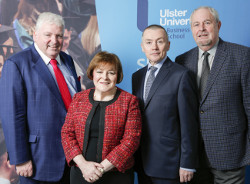
“My leadership style is simple, open, honest and visible. It’s all about standing up in front of people and telling them things as they are.”
These were just some of the thoughts shared with business leaders by IAG Chief Executive Willie Walsh, keynote speaker at the PKF-FPM Annual Leadership Talk, Management Month initiative, in association with the Ulster University Business School, at the Belfast campus.
Originally from Dublin, and now based in London, Willie Walsh began his career as a cadet pilot with Aer Lingus in 1979. Gaining a Master’s Degree from Trinity College Dublin, he became an aircraft Captain before joining the airline’s management team.
International Airlines Group (IAG) was formed in 2011 with Willie Walsh as Chief Executive when British Airways merged with Spanish carrier Iberia. Since then it has acquired further carriers, and become one of the world’s largest airline groups.
During the one hour conversation with broadcaster Gerry Kelly, Willie’s ambition for IAG, his passion for the sector and his relentless work ethic was evident as he traced his career, often through very challenging circumstances. Despite his success Willie’s characteristic modesty was also evident. “I’m the last person you should model yourself on or seek advice from. I just don’t do it the way others have done it. I’ve never planned my career.”
Speaking at the capacity event, PKF-FPM Accountant’s Managing Director, Feargal McCormack, stated that Willie’s approach to leadership, his personal drive and his professional ambition was inspiring. “Willie Walsh is a modern day leader from whom we can learn a great deal.”
Professor Marie McHugh, Dean of the Ulster University Business School said, “We were delighted to work with Professor Feargal McCormack and his team at PKF-FPM in organising this Annual Leadership Talk. It was inspirational to host such a successful businessman as Willie Walsh who really does walk the talk.”
Image: IAG Chief Executive Willie Walsh (second right) pictured with Professor Feargal McCormack, Professor Marie McHugh and broadcaster Gerry Kelly before the PKF-FPM Annual Leadership Talk.
Source: Ulster University Business School
Back to top

3 February 2016 - Ulster University Business School Student prepares to be ‘hired’
Matthew McClenaghan, a second year BSc Accounting student at the Ulster University Business School has out-scored over 100 of his peers to win the inaugural BDO Interview Award.
Organised by the Business School and the University’s Careers/Employability Unit, with support from BDO Northern Ireland, the Award process comprised a series of mock interviews undertaken by senior staff from both organisations over a four day period.
Professor Gillian Armstrong, a Head of Department within the Business School, explains, “Our role at the Business School is to equip students with the professional skills and commercial awareness for their professional lives. Being able to perform appropriately and with confidence in an interview is one of the most important skills any student can develop, as it is often the gateway to their future career. By working in partnership with BDO we have been able to offer an invaluable experience to our students which has not only challenged them but also highlighted many areas of strength (and talent!) on which to build for placement and graduate recruitment.”
The participating students are all undertaking a new and innovative module on Career Entrepreneurship as part of the BSc Hons Accounting and the BSc Finance and Investment Analysis programmes within the Business School. As the top performing student Matthew received a monetary award and can now look forward to a summer placement and mentoring in the BDO Northern Ireland offices in Belfast.
Suzanne Creed, Senior Manager at BDO and an alumni of Ulster University added, “By supporting this initiative it builds upon an already well-established partnership with the Ulster University Business School. At BDO Northern Ireland we are passionate about supporting and developing the skills of our future leaders and in doing so we endeavour to support and give back to our local Universities regularly. The BDO Interview award is one of many activities that are so important for developing students’ skills, experience and employability and we are delighted to support such a valuable initiative.”
Image: Suzanne Creed; Matthew McClenaghan; Glenda Martin, Career Development Consultant; and Professor Gillian Armstrong.
Source: Ulster University Business School
Back to top